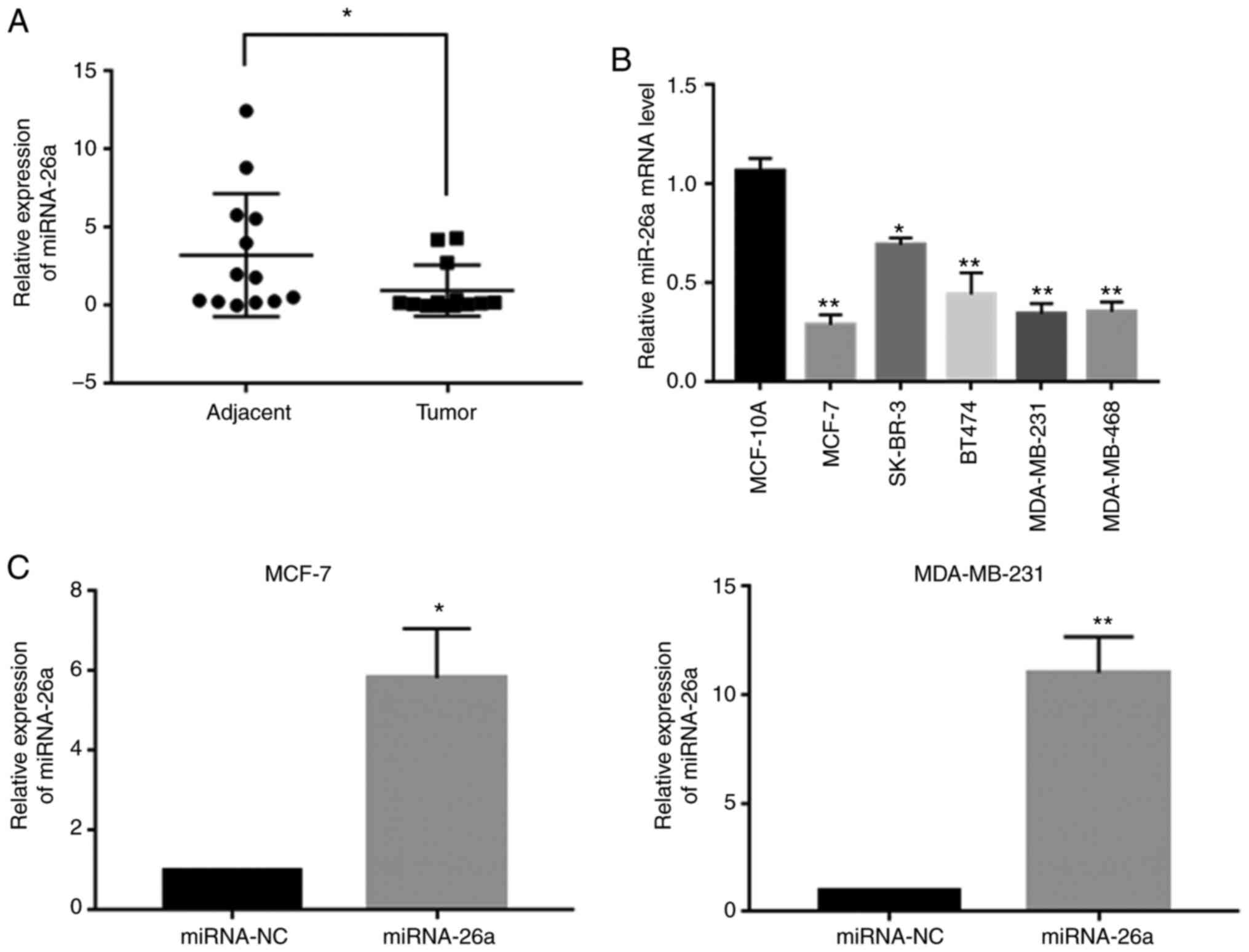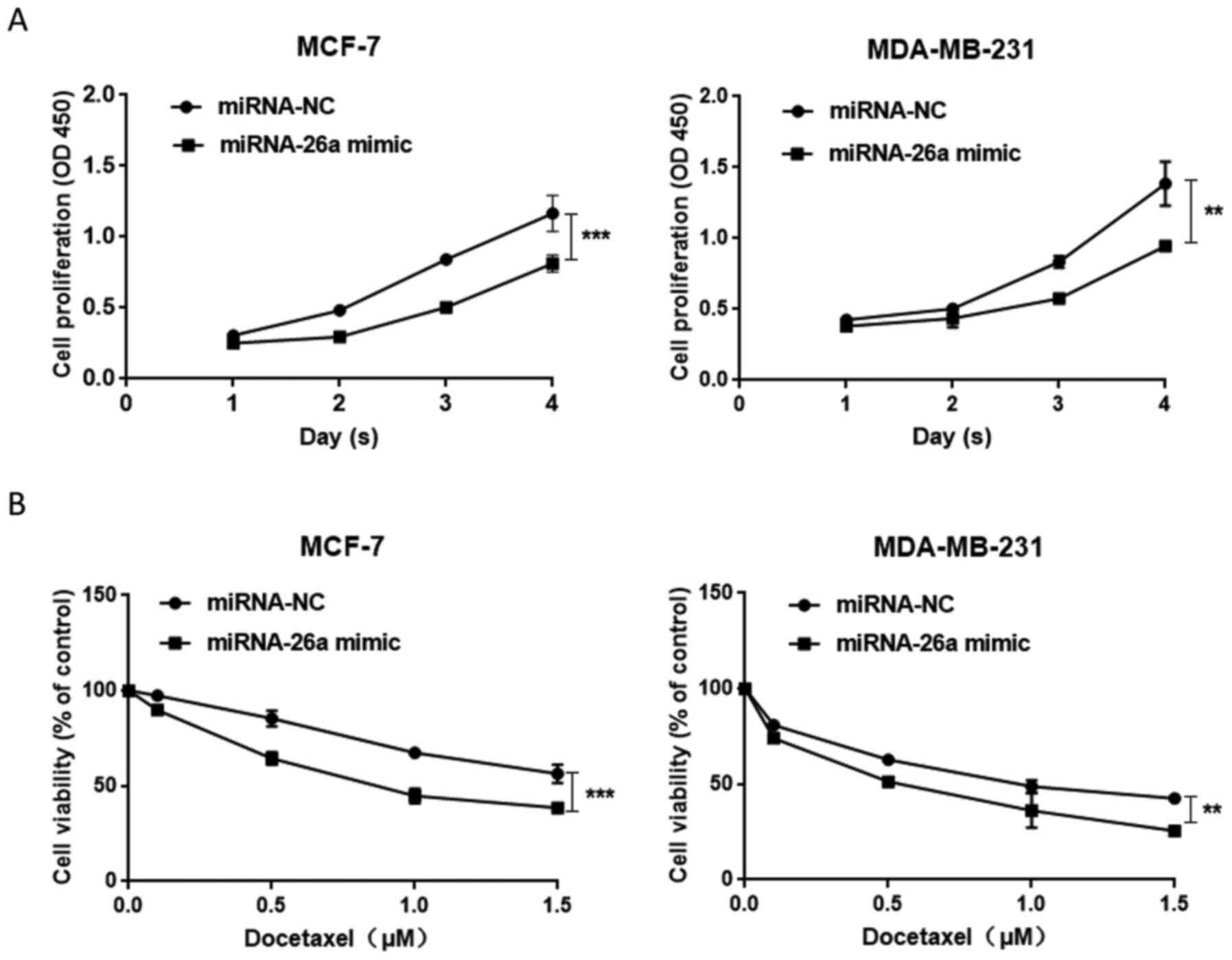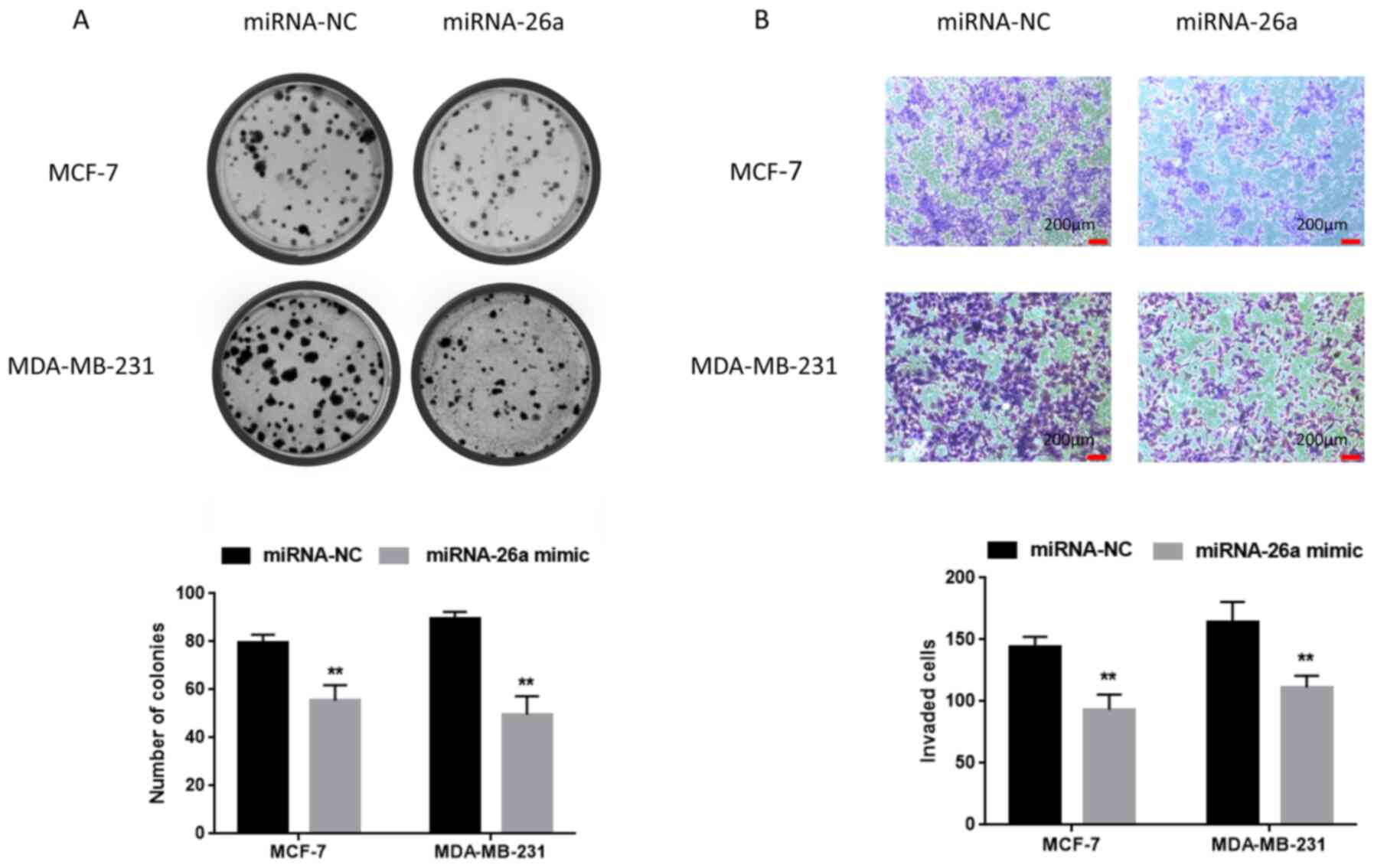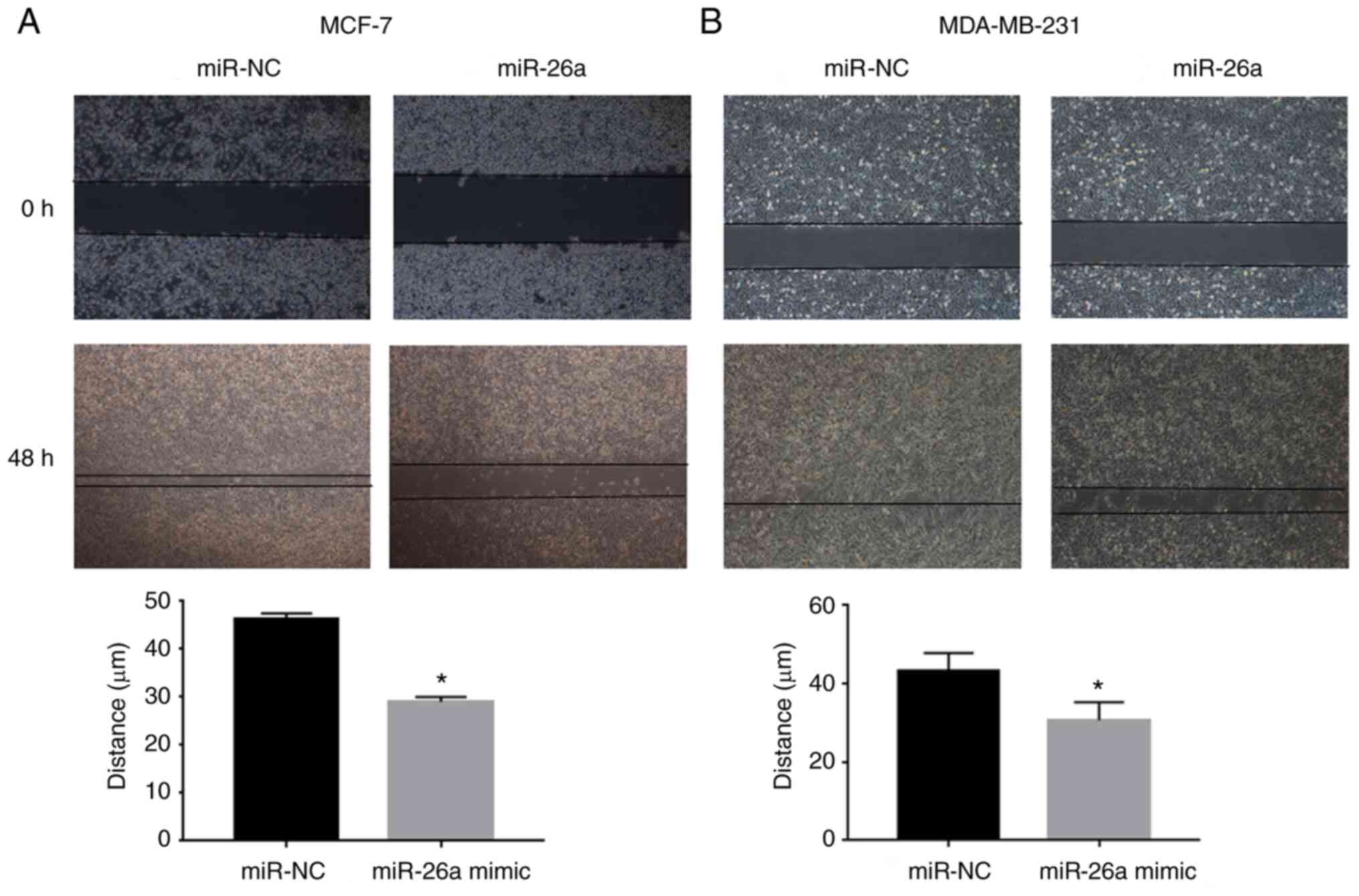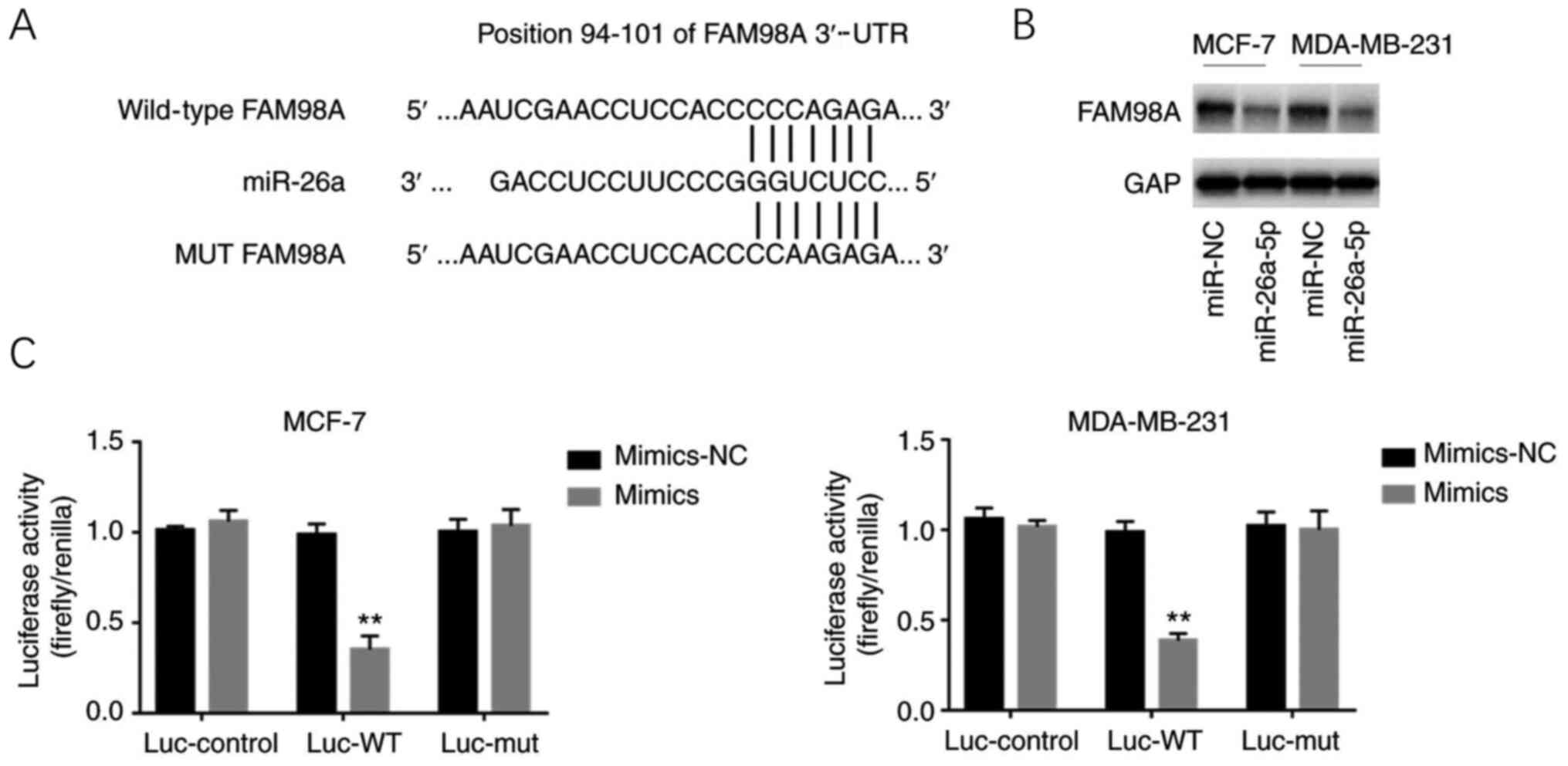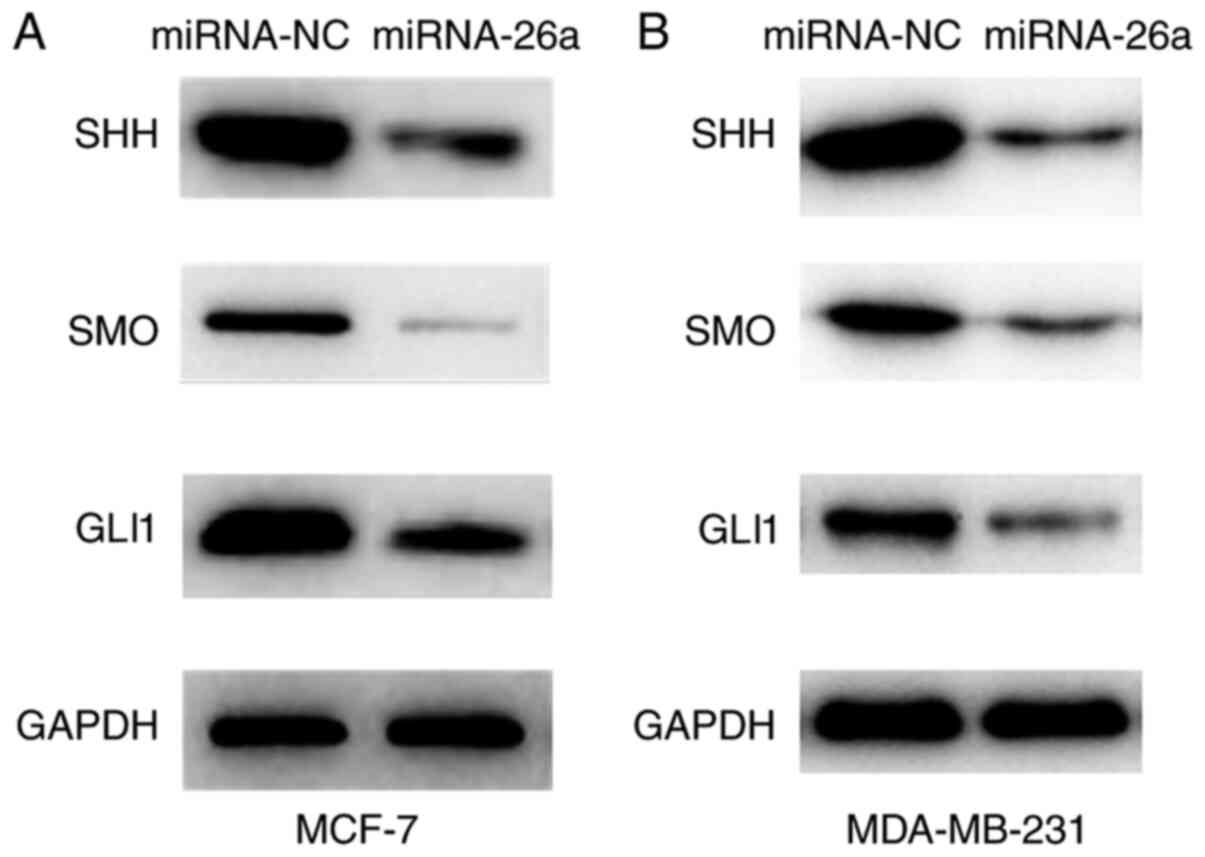|
1
|
Siegel RL, Miller KD and Jemal A: Cancer
statistics, 2019. CA Cancer J Clin. 69:7–34. 2019. View Article : Google Scholar : PubMed/NCBI
|
|
2
|
Baltzer PAT, Kapetas P, Marino MA and
Clauser P: New diagnostic tools for breast cancer. Memo.
10:175–180. 2017. View Article : Google Scholar : PubMed/NCBI
|
|
3
|
Gomez-Miragaya J, Moran S,
Calleja-Cervantes ME, Collado-Sole A, Pare L, Gomez A, Serra V,
Dobrolecki LE, Lewis MT, Diaz-Lagares A, et al: The altered
transcriptome and DNA methylation profiles of docetaxel resistance
in breast cancer PDX models. Mol Cancer Res. 17:2063–2076. 2019.
View Article : Google Scholar : PubMed/NCBI
|
|
4
|
Huang P, Li F, Li L, You Y, Luo S, Dong Z,
Gao Q, Wu S, Brunner N and Stenvang J: lncRNA profile study reveals
the mRNAs and lncRNAs associated with docetaxel resistance in
breast cancer cells. Sci Rep. 8:179702018. View Article : Google Scholar : PubMed/NCBI
|
|
5
|
Fan L, Strasser-Weippl K, Li JJ, St LJ,
Finkelstein DM, Yu KD, Chen WQ, Shao ZM and Goss PE: Breast cancer
in China. Lancet Oncol. 15:e279–e289. 2014. View Article : Google Scholar : PubMed/NCBI
|
|
6
|
Rupaimoole R and Slack FJ: MicroRNA
therapeutics: Towards a new era for the management of cancer and
other diseases. Nat Rev Drug Discov. 16:203–222. 2017. View Article : Google Scholar : PubMed/NCBI
|
|
7
|
Guo H, Ingolia NT, Weissman JS and Bartel
DP: Mammalian microRNAs predominantly act to decrease target mRNA
levels. Nature. 466:835–840. 2010. View Article : Google Scholar : PubMed/NCBI
|
|
8
|
Jeffries J, Zhou W, Hsu AY and Deng Q:
miRNA-223 at the crossroads of inflammation and cancer. Cancer
Lett. 451:136–141. 2019. View Article : Google Scholar : PubMed/NCBI
|
|
9
|
Si W, Shen J, Zheng H and Fan W: The role
and mechanisms of action of microRNAs in cancer drug resistance.
Clin Epigenetics. 11:252019. View Article : Google Scholar : PubMed/NCBI
|
|
10
|
He XH, Zhu W, Yuan P, Jiang S, Li D, Zhang
HW and Liu MF: miR-155 downregulates ErbB2 and suppresses
ErbB2-induced malignant transformation of breast epithelial cells.
Oncogene. 35:6015–6025. 2016. View Article : Google Scholar : PubMed/NCBI
|
|
11
|
Jafri MA, Al-Qahtani MH and Shay JW: Role
of miRNAs in human cancer metastasis: Implications for therapeutic
intervention. Semin Cancer Biol. 44:117–131. 2017. View Article : Google Scholar : PubMed/NCBI
|
|
12
|
Chen J, Zhang K, Xu Y, Gao Y, Li C, Wang R
and Chen L: The role of microRNA-26a in human cancer progression
and clinical application. Tumour Biol. 37:7095–7108. 2016.
View Article : Google Scholar : PubMed/NCBI
|
|
13
|
Huang ZM, Ge HF, Yang CC, Cai Y, Chen Z,
Tian WZ and Tao JL: MicroRNA-26a-5p inhibits breast cancer cell
growth by suppressing RNF6 expression. Kaohsiung J Med Sci.
35:467–473. 2019.PubMed/NCBI
|
|
14
|
Akter KA, Mansour MA, Hyodo T, Ito S,
Hamaguchi M and Senga T: FAM98A is a novel substrate of PRMT1
required for tumor cell migration, invasion, and colony formation.
Tumour Biol. 37:4531–4539. 2016. View Article : Google Scholar : PubMed/NCBI
|
|
15
|
Akter KA, Mansour MA, Hyodo T and Senga T:
FAM98A associates with DDX1-C14orf166-FAM98B in a novel complex
involved in colorectal cancer progression. Int J Biochem Cell Biol.
84:1–13. 2017. View Article : Google Scholar : PubMed/NCBI
|
|
16
|
Li Z, Li N, Sun X and Wang J: FAM98A
promotes cancer progression in endometrial carcinoma. Mol Cell
Biochem. 459:131–139. 2019. View Article : Google Scholar : PubMed/NCBI
|
|
17
|
Zheng R, Liu Q, Wang T, Wang L and Zhang
Y: FAM98A promotes proliferation of non-small cell lung cancer
cells via the P38-ATF2 signaling pathway. Cancer Manag Res.
10:2269–2278. 2018. View Article : Google Scholar : PubMed/NCBI
|
|
18
|
Livak KJ and Schmittgen TD: Analysis of
relative gene expression data using real-time quantitative PCR and
the 2(-Delta Delta C(T)) method. Methods. 25:402–408. 2001.
View Article : Google Scholar : PubMed/NCBI
|
|
19
|
Katoh M: Genomic testing, tumor
microenvironment and targeted therapy of Hedgehog-related human
cancers. Clin Sci (Lond). 133:953–970. 2019. View Article : Google Scholar : PubMed/NCBI
|
|
20
|
Riaz SK, Khan JS, Shah STA, Wang F, Ye L,
Jiang WG and Malik MFA: Involvement of hedgehog pathway in early
onset, aggressive molecular subtypes and metastatic potential of
breast cancer. Cell Commun Signal. 16:32018. View Article : Google Scholar : PubMed/NCBI
|
|
21
|
Ma L: MicroRNA and Metastasis. Adv Cancer
Res. 132:165–207. 2016. View Article : Google Scholar : PubMed/NCBI
|
|
22
|
Braicu C, Raduly L, Morar-Bolba G,
Cojocneanu R, Jurj A, Pop LA, Pileczki V, Ciocan C, Moldovan A,
Irimie A, et al: Aberrant miRNAs expressed in HER-2 negative breast
cancers patient. J Exp Clin Cancer Res. 37:2572018. View Article : Google Scholar : PubMed/NCBI
|
|
23
|
Fridrichova I and Zmetakova I: MicroRNAs
contribute to breast cancer invasiveness. Cells. 8:13612019.
View Article : Google Scholar
|
|
24
|
Biswas S: MicroRNAs as therapeutic agents:
The future of the battle against cancer. Curr Top Med Chem.
18:2544–2554. 2018. View Article : Google Scholar : PubMed/NCBI
|
|
25
|
Yang C, Tabatabaei SN, Ruan X and Hardy P:
The dual regulatory role of MiR-181a in breast cancer. Cell Physiol
Biochem. 44:843–856. 2017. View Article : Google Scholar : PubMed/NCBI
|
|
26
|
Li Y, Wang P, Wu LL, Yan J, Pang XY and
Liu SJ: miR-26a-5p inhibit gastric cancer cell proliferation and
invasion through mediated Wnt5a. Onco Targets Ther. 13:2537–2550.
2020. View Article : Google Scholar : PubMed/NCBI
|
|
27
|
Ma Y, Deng F, Li P, Chen G, Tao Y and Wang
H: The tumor suppressive miR-26a regulation of FBXO11 inhibits
proliferation, migration and invasion of hepatocellular carcinoma
cells. Biomed Pharmacother. 101:648–655. 2018. View Article : Google Scholar : PubMed/NCBI
|
|
28
|
Guo K, Zheng S, Xu Y, Xu A, Chen B and Wen
Y: Loss of miR-26a-5p promotes proliferation, migration, and
invasion in prostate cancer through negatively regulating SERBP1.
Tumour Biol. 37:12843–12854. 2016. View Article : Google Scholar : PubMed/NCBI
|
|
29
|
Wu F, Zhang Y, Sun B, McMahon AP and Wang
Y: Hedgehog signaling: From basic biology to cancer therapy. Cell
Chem Biol. 24:252–280. 2017. View Article : Google Scholar : PubMed/NCBI
|
|
30
|
Hanna A and Shevde LA: Hedgehog signaling:
Modulation of cancer properies and tumor mircroenvironment. Mol
Cancer. 15:242016. View Article : Google Scholar : PubMed/NCBI
|
|
31
|
Abe Y and Tanaka N: Fine-Tuning of GLI
activity through arginine methylation: Its mechanisms and function.
Cells. 9:19732020. View Article : Google Scholar
|
|
32
|
Wang Y, Hsu JM, Kang Y, Wei Y, Lee PC,
Chang SJ, Hsu YH, Hsu JL, Wang HL, Chang WC, et al: Oncogenic
functions of gli1 in pancreatic adenocarcinoma are supported by its
PRMT1-Mediated methylation. Cancer Res. 76:7049–7058. 2016.
View Article : Google Scholar : PubMed/NCBI
|















